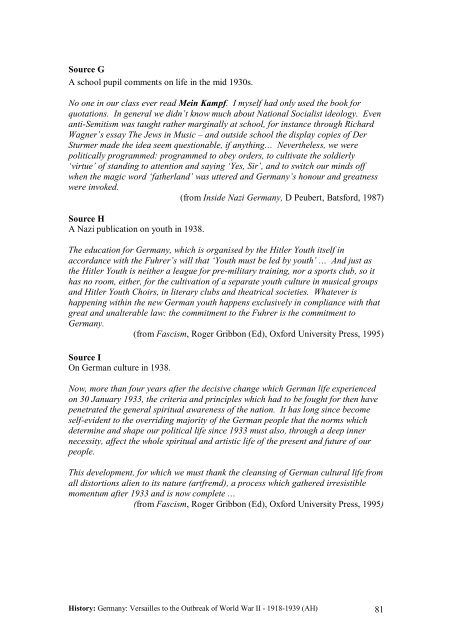PDF file: History - Advanced Higher - Germany - Education Scotland
PDF file: History - Advanced Higher - Germany - Education Scotland
PDF file: History - Advanced Higher - Germany - Education Scotland
You also want an ePaper? Increase the reach of your titles
YUMPU automatically turns print PDFs into web optimized ePapers that Google loves.
Source G<br />
A school pupil comments on life in the mid 1930s.<br />
No one in our class ever read Mein Kampf. I myself had only used the book for<br />
quotations. In general we didn’t know much about National Socialist ideology. Even<br />
anti-Semitism was taught rather marginally at school, for instance through Richard<br />
Wagner’s essay The Jews in Music – and outside school the display copies of Der<br />
Sturmer made the idea seem questionable, if anything… Nevertheless, we were<br />
politically programmed: programmed to obey orders, to cultivate the soldierly<br />
‘virtue’ of standing to attention and saying ‘Yes, Sir’, and to switch our minds off<br />
when the magic word ‘fatherland’ was uttered and <strong>Germany</strong>’s honour and greatness<br />
were invoked.<br />
(from Inside Nazi <strong>Germany</strong>, D Peubert, Batsford, 1987)<br />
Source H<br />
A Nazi publication on youth in 1938.<br />
The education for <strong>Germany</strong>, which is organised by the Hitler Youth itself in<br />
accordance with the Fuhrer’s will that ‘Youth must be led by youth’ … And just as<br />
the Hitler Youth is neither a league for pre-military training, nor a sports club, so it<br />
has no room, either, for the cultivation of a separate youth culture in musical groups<br />
and Hitler Youth Choirs, in literary clubs and theatrical societies. Whatever is<br />
happening within the new German youth happens exclusively in compliance with that<br />
great and unalterable law: the commitment to the Fuhrer is the commitment to<br />
<strong>Germany</strong>.<br />
(from Fascism, Roger Gribbon (Ed), Oxford University Press, 1995)<br />
Source I<br />
On German culture in 1938.<br />
Now, more than four years after the decisive change which German life experienced<br />
on 30 January 1933, the criteria and principles which had to be fought for then have<br />
penetrated the general spiritual awareness of the nation. It has long since become<br />
self-evident to the overriding majority of the German people that the norms which<br />
determine and shape our political life since 1933 must also, through a deep inner<br />
necessity, affect the whole spiritual and artistic life of the present and future of our<br />
people.<br />
This development, for which we must thank the cleansing of German cultural life from<br />
all distortions alien to its nature (artfremd), a process which gathered irresistible<br />
momentum after 1933 and is now complete …<br />
(from Fascism, Roger Gribbon (Ed), Oxford University Press, 1995)<br />
<strong>History</strong>: <strong>Germany</strong>: Versailles to the Outbreak of World War II - 1918-1939 (AH) 81
















